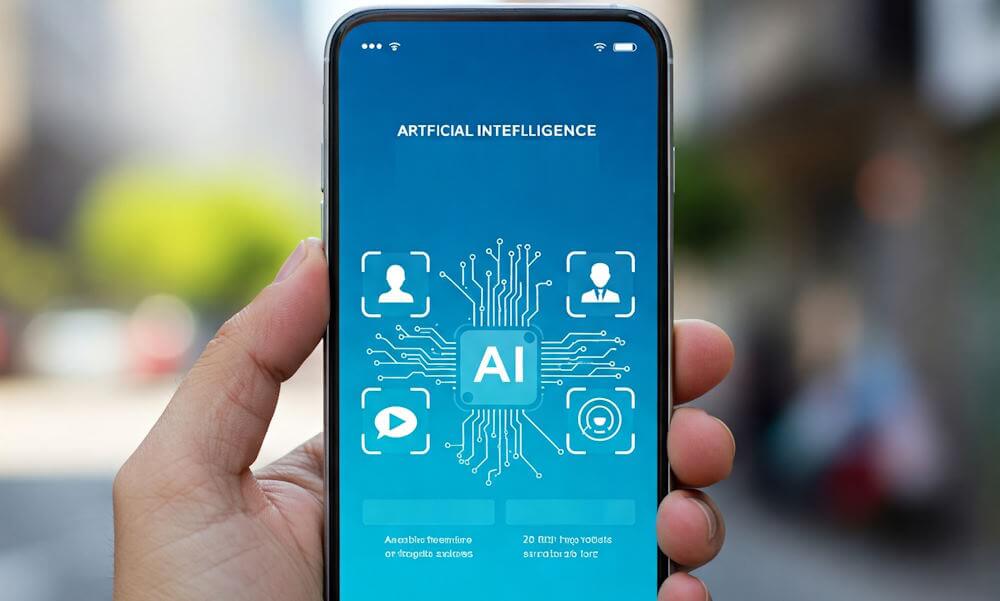Artificial intelligence (AI) represents a transformative approach to technology, encompassing systems that simulate human intelligence through learning, reasoning, and self-correction. Within the realm of mobile applications, AI is driving significant advancements that are reshaping user interactions and functionalities. The integration of AI technologies into mobile apps has evolved considerably over the past years, with developers increasingly leveraging AI to enhance application capabilities.
The evolution of mobile apps can be traced back to their inception, where initial designs focused on basic functionalities. However, as smartphone technology advanced, so did the expectations of users. The contemporary mobile app landscape is characterized by an emphasis on user experience, and AI plays a crucial role in achieving this. With features such as chatbots, personalized content recommendations, and predictive analytics, AI significantly improves users’ interactions with applications, creating a more intuitive environment.
The significance of AI in mobile apps extends beyond merely enhancing user experience; it also contributes to efficiency and personalization. AI-driven features can analyze user data to offer tailored recommendations, thereby increasing user engagement and satisfaction. For instance, streaming apps utilize AI algorithms to analyze viewing habits, ensuring that users are presented with content that aligns with their preferences. Furthermore, through automation and machine learning, AI streamlines app functionalities, reducing unnecessary processes and improving overall efficiency.
As AI technology continues to advance, its integration into mobile applications will likely grow deeper, making it essential for developers to understand and implement these technologies. By harnessing AI’s potential, developers can create applications that not only meet but exceed user expectations, cementing their role in an increasingly competitive market. This intersection of artificial intelligence and mobile app development ultimately sets the stage for innovative solutions that revolutionize the way users interact with technology.
Enhancing User Experience through AI
The integration of artificial intelligence (AI) technologies in mobile applications has significantly transformed user interactions, leading to more intuitive and seamless experiences. One of the prominent AI advancements is natural language processing (NLP), which enables apps to understand and interpret human language in a more natural way. This technology allows users to engage with applications through voice commands or text input, making interactions more efficient and user-friendly.
For instance, chatbots powered by AI have become commonplace in various mobile applications, from customer service to e-commerce. These chatbots can understand user inquiries and provide relevant responses, offering instant support and reducing the need for human intervention. This not only enhances the user experience by providing quick and reliable assistance but also helps businesses save time and resources. The ability of chatbots to learn and adapt through machine learning further improves their effectiveness, allowing them to offer personalized recommendations and solutions based on user behavior and preferences.
Moreover, voice recognition technology is revolutionizing how users interact with their devices. By permitting hands-free command execution, voice recognition streamlines processes such as sending messages, making calls, or retrieving information. This functionality is particularly beneficial for individuals multitasking or those with disabilities, as it reduces barriers to accessing mobile app features. AI-driven voice assistants, such as Siri or Google Assistant, illustrate how voice recognition is being harnessed to create a more interactive and engaging user experience.
Incorporating AI technologies in mobile applications ultimately leads to enhanced personalization and improved user satisfaction. Users are more likely to engage with and remain loyal to apps that provide intuitive, efficient interactions. As AI continues to evolve, its role in enhancing user experiences in mobile applications will undoubtedly expand even further.
Personalization and Customization
Artificial Intelligence (AI) has revolutionized the way mobile applications deliver personalized content and services to users. This is predominantly realized through the implementation of recommendation systems, which leverage machine learning algorithms to analyze user behavior patterns. By studying the interactions and preferences of individual users, AI can provide tailored suggestions that enhance user experience significantly. For instance, streaming services utilize AI to recommend shows or movies based on viewing history, making content discovery seamless and engaging.
Moreover, user behavior analysis plays a pivotal role in optimizing mobile app experiences. AI technologies can track how users navigate through an application, noting their interests and the features they most commonly utilize. This information is crucial for developers, enabling them to refine app interfaces and functionality according to the specific needs and preferences of their user base. By examining data from millions of app interactions, AI can identify trends and anomalies, ensuring that applications deliver value effectively and efficiently.
Adaptive interfaces further contribute to the personalization of mobile applications. By employing AI, apps can adjust their layouts and functionalities based on the contextual behavior of users. For example, an app may present different user options depending on the time of day or location, thereby improving usability. Such dynamic responses create a more intuitive and engaging experience that keeps users returning to the app. Ultimately, these strategies contribute to higher user retention rates and increased satisfaction.
In essence, the role of AI in crafting personalized and customized experiences in mobile applications is indispensable. By harnessing the capabilities of recommendations systems, behavior analysis, and adaptive interfaces, developers can significantly enhance user engagement and retention. As a result, the integration of AI in mobile apps is not only a competitive advantage but also a necessity in today’s digital landscape.
AI in Mobile App Development and Testing
Artificial Intelligence (AI) has significantly transformed various facets of mobile app development and testing, driving efficiencies and enhancing the overall quality of applications. By incorporating AI-driven tools, developers can streamline their coding processes, resulting in faster application deployment and reduced time-to-market. These tools are designed to analyze existing codebases, suggest improvements, and even generate code snippets automatically, which greatly enhances coding efficiency.
Moreover, AI’s role extends beyond development into the realm of testing. Automated testing, an AI-powered process, allows for the continuous assessment of applications throughout the development lifecycle. This method ensures the identification of potential bugs and vulnerabilities early in the process, thus mitigating risks associated with software release. Advanced AI algorithms can accurately simulate user interactions, enabling developers to assess app performance under various conditions and scenarios. As a result, testing becomes more comprehensive and requires less manual intervention.
Predictive analytics is another advantage that AI brings to mobile app development and testing. By leveraging historical data, AI tools can predict potential failure points within the code, allowing teams to address issues before they escalate. This anticipatory approach not only enhances the reliability of mobile applications but also increases user satisfaction by minimizing crashes and other malfunctions commonly experienced in less rigorously tested applications.
Furthermore, AI can optimize the testing process by enabling continuous integration and continuous deployment (CI/CD) practices. Automated updates can be executed seamlessly, thus ensuring that the app remains relevant and functional in an ever-evolving technological landscape. By integrating AI into mobile app development and testing, organizations can achieve a competitive advantage, ultimately leading to more robust, user-friendly applications.
Security Enhancements with AI
In recent years, the integration of artificial intelligence (AI) in mobile applications has significantly transformed the security landscape. AI technologies are playing a crucial role in enhancing security measures, which is vital for safeguarding sensitive user data. One of the most prominent contributions of AI is its ability to detect threats in real-time. Traditional security systems often struggle with identifying novel threats, but machine learning algorithms can analyze vast amounts of data to recognize unusual patterns indicative of potential security breaches.
Furthermore, AI enhances fraud prevention mechanisms. Fraudulent activities, such as identity theft and payment fraud, can adversely affect users and businesses alike. AI systems can monitor user behavior and establish a baseline for normal activity. Any deviation from this baseline, such as multiple login attempts from different geographical locations in a short amount of time, triggers alerts and prompts further investigation. By utilizing AI for this purpose, mobile applications can mitigate risks and ensure a safer environment for users.
Another significant area where AI strengthens mobile application security is in user authentication methods. Biometric verification, such as fingerprint scans and facial recognition, has become increasingly popular. AI-driven biometric systems learn and adapt to individual user characteristics, improving accuracy and reducing false rejections. These intelligent systems can discern between genuine users and potential imposters, enhancing access control and user trust. As mobile applications increasingly adopt biometric solutions, the integration of AI further refines these processes and addresses various vulnerabilities associated with traditional authentication methods.
Overall, the impact of artificial intelligence in mobile application security cannot be overstated. Its capabilities in threat detection, fraud prevention, and advanced user authentication create a more secure environment for users and developers alike. Enhanced security features not only protect sensitive data but also foster greater user confidence in mobile applications, thus driving wider adoption and usage.
AI-Driven Analytics for Mobile Apps
Artificial intelligence (AI) has revolutionized the landscape of mobile application development, particularly in the realm of analytics. By leveraging AI-driven analytics, developers can unearth valuable insights into user behavior and app performance. These insights are derived from the profound data processing capabilities of AI, enabling a more nuanced understanding of user engagement patterns and preferences. For instance, AI tools can analyze vast amounts of data collected from user interactions within the app, identifying trends and anomalies that may not be evident through traditional analytics methods.
One of the key benefits of utilizing AI in mobile app analytics is the ability to segment users effectively. Machine learning algorithms can classify users based on their behavior, preferences, and usage patterns, allowing developers to tailor their offerings accordingly. This segmentation can inform marketing strategies, ensuring that promotions and in-app notifications resonate more effectively with different user groups. Moreover, by analyzing user journeys and interactions, AI can identify points of friction and areas where users might drop off. Addressing these issues can significantly enhance user retention rates and improve overall app satisfaction.
Additionally, AI-driven analytics provide real-time insights, empowering app developers to make informed decisions swiftly. With the ability to monitor key performance indicators continuously, developers can adapt their strategies to meet changing user demands promptly. Whether it’s adjusting user interfaces, modifying content delivery, or optimizing advertising campaigns, AI allows for a data-informed approach to enhancements. Furthermore, predictive analytics powered by AI can forecast future trends, helping businesses to stay proactive rather than reactive. As a result, the integration of AI-driven analytics into mobile apps not only facilitates app improvements but also strengthens marketing initiatives, thereby ensuring that businesses remain competitive in a dynamic market.
Challenges and Limitations of AI in Mobile Apps
The integration of artificial intelligence (AI) in mobile applications presents numerous advantages, yet it also encounters significant challenges and limitations that must be addressed for successful implementation. One of the primary concerns revolves around data privacy. As mobile apps often require access to personal user information to function optimally, there is a heightened risk of data breaches. Users are becoming increasingly aware of their data rights and privacy, prompting developers to prioritize secure data handling practices and transparent privacy policies. Striking a balance between data utility for enhancing AI functionalities and safeguarding user privacy represents a formidable challenge.
Moreover, algorithmic bias poses another major limitation to the deployment of AI in mobile apps. AI systems learn from data, and if this data is skewed or unrepresentative of the user population, the AI may develop biased algorithms. Such biases can lead to unfair treatment of specific groups, potentially exacerbating social inequalities. Ensuring fairness in AI applications necessitates diligent data curation and continuous assessment of AI decision-making processes. Consequently, developers must be vigilant in choosing diverse datasets and implementing bias mitigation strategies to cultivate higher levels of equity across their applications.
Furthermore, the requirement for high-quality data cannot be overstated. AI models heavily depend on vast amounts of accurate, relevant data to produce reliable results. In situations where data scarcity or poor data quality is an issue, the effectiveness of the AI may be significantly compromised. This limitation can hinder innovation and lead to subpar user experiences. Developers must invest in data quality improvement initiatives and explore innovative data collection methods to enhance the robustness of AI systems in their mobile applications. Addressing these challenges will be crucial in unlocking the full potential of AI in mobile app development.
Future Trends of AI in Mobile Applications
As artificial intelligence continues to evolve, its influence on mobile applications is anticipated to expand significantly in the coming years. One of the most notable advancements is the integration of AI technologies, which is expected to enhance personalization features. Mobile applications are increasingly leveraging machine learning algorithms to analyze user behavior and preferences, allowing for tailored content and recommendations. This shift towards personalization not only improves user engagement but also fosters brand loyalty, as users feel understood and valued by the applications they interact with.
Another significant development is the advent of 5G technology, which is poised to revolutionize mobile app capabilities. With its increased speed and lower latency, 5G will facilitate real-time data processing and communication, enabling sophisticated AI applications to function seamlessly on mobile devices. The combination of AI and 5G technologies will pave the way for enhanced functionalities within mobile apps, such as augmented reality experiences, live translations, and improved conversational interfaces. These advancements will create more immersive and interactive user experiences, ultimately reshaping how individuals engage with mobile applications.
Moreover, the rise of AI-powered chatbots and virtual assistants within mobile apps is expected to become more prevalent. These intelligent systems can provide users with instant support, personalized recommendations, and even perform tasks autonomously. As natural language processing and speech recognition technologies improve, users will increasingly rely on these AI components to enhance their interactions with mobile apps, making everyday tasks more efficient.
In conclusion, the future of AI in mobile applications holds immense potential, driven by advancements in AI technologies and the capabilities brought forth by 5G networks. As these trends gain momentum, users can expect more personalized, efficient, and engaging experiences, fundamentally transforming the landscape of mobile applications as we know it.
Conclusion
Throughout this blog post, we have explored the profound impact that artificial intelligence (AI) has had on mobile applications. The integration of AI technologies has fundamentally transformed how users interact with their devices, leading to enhanced user experiences, increased efficiency, and innovative functionalities. From personalized recommendations to advanced voice recognition and intuitive user interfaces, AI has played a pivotal role in elevating the capabilities of mobile apps.
Moreover, the use of machine learning algorithms allows mobile applications to learn from user behavior and adapt accordingly. This responsiveness not only improves user satisfaction but also encourages user engagement, which is essential for the longevity of mobile applications in a competitive market. Furthermore, AI-driven analytics provide developers with valuable insights into user patterns, enabling them to make informed decisions regarding app updates and features.
As we move forward, staying abreast of AI advancements will be crucial for developers and businesses alike. The dynamic nature of mobile technology demands a proactive approach in embracing artificial intelligence to remain competitive. By leveraging AI, app creators can foster innovative solutions, enhancing functionality and user satisfaction significantly. As the landscape of mobile technology evolves, the integration of AI stands out as a critical factor in shaping the future of mobile applications.
In conclusion, the transformative impact of artificial intelligence on mobile applications is undeniable. It is imperative for developers to embrace AI technologies, as they facilitate not only improved functionalities but also drive user engagement and satisfaction. Therefore, investing in these smart technologies is no longer optional but essential in navigating the ever-changing world of mobile apps.




